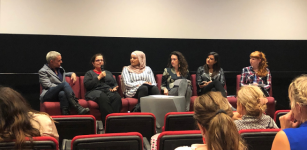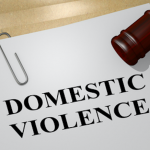Voices for Change: Shifting Attitudes Via the Media to End Gender-Based Violence

In November last year, Alia and her 2-year-old daughter Emily showed up at a Newcastle support service after having fled a domestic violence situation. A Bangladeshi national on a student visa with no money, Alia was left with little options after having left the Australian father of her child.
Alia feared being deported, as she’s from a persecuted minority. And as she’d fled her domestic situation in hurry, Alia had no belongings and no access to income. There was no free legal advice available to address the violence. And her visa status restricted her ability to work.
A multicultural support service was unwilling to provide assistance because Alia was on a student visa. And there were no spaces available at a local shelter. After a few days, the housing department was only able to offer five days temporary accommodation.
In the end, the only option available for Alia was to return to her abusive partner.
Lived experiences forging change
Alia’s story is not unique. A number of women in this state with a temporary visa status and no income find there are a lack of support services available for them when experiencing gender-based violence.
And it’s these real life stories that the just launched Voices for Change project to end sexual, domestic and family violence seeks to get out to the media. Led by Domestic Violence NSW (DVNSW), the project aims to change attitudes and prevent violence by having survivors tell their stories.
“At DVNSW we believe that gendered violence is preventable,” explained Voices for Change project coordinator Renata Field. “We know that personal stories can have an enormous impact in changing community attitudes, for example the impact of Rosie Batty’s story.”
According to Ms Field, the focus on “murder-centric reporting” has to shift, so that a wider understanding of gender-based violence and the underlying issues that contribute to it are presented in the media.
Out of step with the evidence
The project coordinator pointed to the recently released National Community Attitudes Survey. It asserts that one in four Australian women has experienced violence from an intimate partner. However, less people in the community are aware of this today than in the past.
The survey also outlines that 42 percent of Australians think that “it is common for sexual assault accusations to be used as a way of getting back at men”, when it is rare, while 20 percent believe “a lot of what is called domestic violence is really just a normal reaction to day-to-day stress”.
“The project will try to shift these attitudes by offering journalists available and safe victim/survivors who they can interview about gendered violence,” Ms Field told Sydney Criminal Lawyers®.
Systemic failures
Saskia decided to leave her partner after he physically abused her over a two year period ending in 2012. However, after she left him, he continued to verbally, emotionally and financially abuse her, as well as stalk her.
A series of poor responses from support systems led to this ongoing abuse. Police failed to file evidence in an apprehended domestic violence order case, which meant she wasn’t able to receive protection. And a magistrate also blamed Saskia for the violence perpetrated against her.
The system’s failure to protect Saskia, and in some circumstances to actually blame her, is not uncommon. And again, more exposure of these domestic violence issues in the media can shift societal attitudes and in turn reform the system.
Broadening the picture, dispelling the myths
“The media presents an important mirror into the community’s understanding of gender-based violence, as well as an integral information source,” Ms Field continued. She stressed that while “journalists are taking the issue seriously”, there is much room for improvement.
Ms Field listed some of the findings of the 2016 ANROWS report on media representations of family violence, which outlines that the vast majority of reporting is “incident-based” and fails delve into the broader issues around this violence.
Reporting could be improved by giving voice to domestic and family violence advocates, as well as those with lived experience of violence, as at present, half of all sources are drawn from police and the criminal justice system, while less than 9 percent is sourced from actual survivors.
“Myths and misrepresentations still find their way into reporting,” the researchers explain. They found that around 15 percent of incident-based reporting involves victim blaming or offers excuses for the perpetrator, like she was drinking, or he was acting out of jealousy.
There’s also a tendency within the media to render the perpetrator invisible, the researchers found. Around 60 percent of incident-based reporting includes no information about the perpetrator whatsoever.
Advocates for change
The peak representative body for specialist domestic and family violence services in the state, Domestic Violence NSW launched the Voices for Change project at the University of Technology on 29 November.
“We have all experienced the power of someone’s real life story touching our hearts,” DVNSW chief executive Moo Baulch said in a media release. “We know that women can need support like we will provide through Voices for Change, as revisiting their experiences of violence can be traumatic.”
Funded by Our Watch, the Voices for Change project aims to provide opportunities for women who have experienced violence to tell their stories to the media and at public events, which will contribute to a more accurate and gender equitable public discourse on violence against women.
Voices for Change is currently seeking volunteer advocates, who will be provided with three days of training to prepare them for public speaking. And the advocates will be ready to engage with the media from March next year.
“The Voices for Change project ensures that the voices of women who have experienced family violence and sexual assault are heard,” Ms Field concluded. “It takes a whole-of-community approach to increase women’s safety and wellbeing.”







